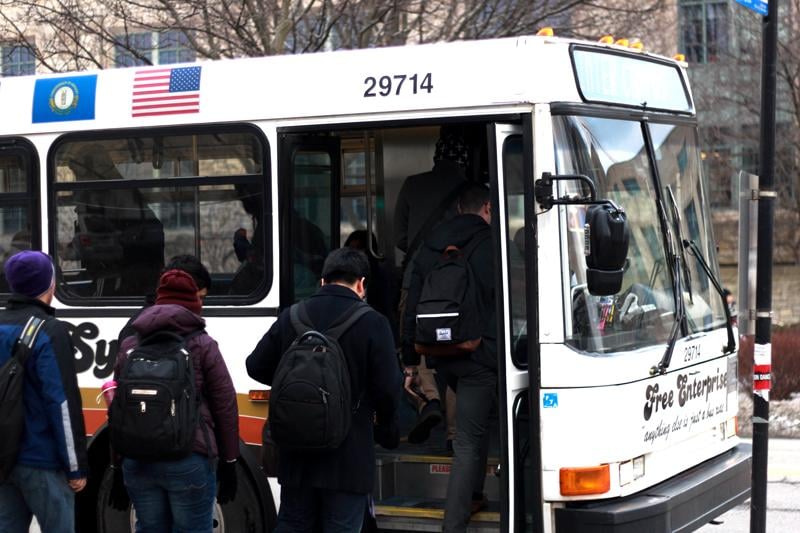Days after Northwestern announced it would discontinue its Chicago Transit Authority 201 Ventra card program — which provided free 201 bus fares for undergraduate students — the response from students has been swift and sharp.
Since Saturday, a petition to restore the program has gathered over 850 signatures, with a goal of reaching 1,000 before being delivered to University administration next month, according to Weinberg junior Beth Asfaw, the petition’s organizer.
Collective to students’ frustration is the loss of a cost-effective public transit option near campus.
Many fear this decision will disproportionately impact first-generation and low-income students, potentially limiting their ability to participate in extracurricular activities and other opportunities while increasing their financial burdens.
The NU-specific Ventra card will now operate like a standard card, requiring students to pay $2.25 for each full CTA bus fare.
Ahead of the 2024-25 academic year, McCormick junior Percy Edmonds recently moved into an apartment complex by Howard Station, which is about an hour’s walk from campus.
“One of the reasons I got an apartment so far from campus was because I knew that I still had (free) transportation to the University,” said Edmonds, a frequent rider of the 201 since his freshman year. “The decision was so last minute and felt like a gut punch.”
He knows that paying out of pocket for CTA fares can “add up really fast.” And to manage such costs, Edmonds said, he might stay home some days to watch class lectures online and start cutting back on other living expenses.
The loss of the shuttle service also raises concerns for students with disabilities or chronic illnesses, who rely on the standardized accommodations for wheelchairs and assistive devices available on all 201 buses, according to the petition.
“For a university that prides itself on being ‘committed to fostering a diverse, inclusive and supportive environment,’ this decision undermines its pledge to ensure that all students have equitable access to the full range of resources needed for their success,” the petition reads.
In 2015, the CTA and NU approved a five-year agreement to provide free services to students boarding the 201 buses with a university-issued ID card. Later, rides required a University-issued Ventra card.
The program’s ridership has continued to climb, averaging about 1,900 daily riders on weekdays as of April this year, according to the Regional Transportation Authority.
To justify its decision, the University said the Intercampus shuttle adequately meets students’ transportation needs in an email to the NU community on Friday.
University spokesperson Hilary Hurd Anyaso told The Daily in a statement that NU has planned “several enhancements to its transportation system” this year. That includes “an improved Safe Ride experience, as well as technology to track and access approaching transit at all hours of the day,” with more details to be provided later this month, Hurd Anyaso said.
Another option NU currently offers to eligible graduate students is a CTA University Pass that requires a quarterly transit card fee.
Other Chicago area universities like the University of Illinois Chicago and Loyola University Chicago also provide a U-Pass for their undergraduate and graduate students, allowing them to ride the CTA on an unlimited basis. And for DePaul University students, the cost for a U-Pass is already included in their tuition.
Weinberg junior Rocco Cappelletti rode the 201 bus at least three to four times a week during the school year to commute across campus and to downtown Evanston, boarding the Metra there.
The Intercampus shuttle has its use too, Cappelletti said, but they noted that the shuttle is more commonly relied on by students for commuting between NU’s campuses.
While both transportation options overlap in similar areas with some stops, the 201 ripples through multiple stops from NU’s Evanston campus to Ryan Field and downtown Evanston — where students like Cappelletti can conveniently commute using the CTA.
“I think folks not knowing how to work the Intercampus shuttle is one thing,” Cappelletti said. “I have also not seen great purpose in using it.”
But for many students who need to commute to programs on and around campus, they will be hurt by the program’s loss.
For SESP sophomore Michael Jurek, riding the 201 was built in his school routine.
With the Intercampus shuttle often unavailable or full when he got out of class, he banked on the free busing to get to his work-study job across campus at the NU Center for Talent Development on time.
“I always saw the 201 as another accessible transportation option, so I was very disappointed when it was removed,” said Jurek, who grew up using public transportation in Chicago. “It was never like that in my head, you had a lot of options instead of just the Intercampus.”
This fall, he was also planning to rely on the service to volunteer at Forging Opportunities for Refugees in America, a local nonprofit in Chicago.
Jurek said he will have to consider alternative options: working less, budgeting more or seeking out other transportation methods.
“It’s a scary thought but something I have to look into,” Jurek said. “It will be really hard for a student like me with a high demonstrated need for aid to keep up with expenses like that.”
Email: jerrywu2027@u.northwestern.edu
X: @Jerrwu
Related Stories:
— Northwestern ends free admission to CTA 201 Ventra card program
— A week after ticketing meltdown, Metra still faces issues on Ventra app
— Northwestern implements University-issued Ventra cards for free admission to CTA 201 bus route







